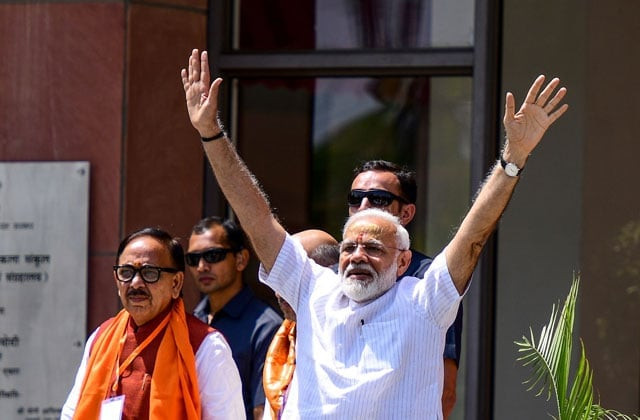BJP’s second stint in power and Muslims
The fundamental reason BJP has won is that it took a number of extreme steps against Muslims in almost all fields

PHOTO: AFP
The recent national elections in India were important for a number of reasons. These elections had to determine the political fate of the BJP and with it the nature of the Indian Union or federation and its secular character. The BJP’s successive second term in office would have a strong influence on India’s foreign policy, specifically its relations with Pakistan.
One may sound optimistic, but the BJP’s second term would be extremely intimidating for the 200 million Muslims of India. India’s ruling party will most likely make the lives of Indian Muslims more miserable as part of a political strategy to appease its core political constituency, comprising radical Hindus of the predominantly Hindu-majority state. The fundamental reason that the BJP has won majority for a second time is that during the last five years of its rule, it took a number of extreme steps against Muslims in almost all fields to make them feel they have been part of a Hindu-dominant country. It made them believe that irrespective of the equal political and constitutional rights of Muslims, like all other Indians, it is practically a Hindu state, governed by the values and norms of Hinduism rather than democratic values. Therefore, like always, the BJP and PM Modi — in run-up to the last elections — vowed and tried to marginalise Muslims in a bid to win the elections.
Since independence, India has been claiming to be a secular state and constitutionally all Indians belonging to any religion are equal and must have equal opportunities to grow. This remained somewhat incorrect as is evident from the fact that India has never had a Muslim prime minister in more than 71 years after independence. In fact, the history of the BJP and its ideological fountainhead, the Rashtriya Swayamsevak Sangh (RSS), shows that the very raison d’être of the movement was to make India a declared Hindu state and bar Muslims from every walk of life in a bid to subjugate them. Now when the BJP has won a successive second term in office, it may decide to have important constitutional changes like declaring India a Hindu state where only Hindus could theoretically occupy important positions in the state structure, legalising the well-established practice over decades. However, the BJP would find it very difficult to give practical shape to its agenda of ostracising Muslims.
Nevertheless, the landslide victory for the BJP would result in more difficulties for the Muslims. More importantly, the BJP is likely to abolish Article 370 of the Indian Constitution, which has given a ‘special’ status to the disputed Kashmir region. Resultantly, Pakistan which has all through been championing the cause of Kashmiris, would protest strongly which may result in extreme deterioration of relations between the two countries.
However, there is also a likelihood for PM Modi to extend an olive branch towards Pakistan for the sake of continued economic growth and development in India, given the fact that Modi — due to his party’s electoral strength in parliament — would be in a position to take drastic steps like improving relations with Pakistan which could open up the entire South and Central Asian regions for India to trade with and make its economic growth sustainable. However, improving its relations with Pakistan would be very difficult for the BJP as by doing so it would negate its very fundamental beliefs. It would be difficult for the party and its allies to take this course unless it is bold enough to do future politics on some other agenda and not on anti-Muslim and anti-Pakistan rhetoric and actions.
The BJP, though, is unlikely to put aside its ideology and work merely for good governance and economic development of India as in this case it would be tantamount to negating the very purpose of the party.
It must be remembered that the reason why the BJP — the political wing of the Hindu revivalist movement of RSS — jumped into the political arena was not merely aimed at grabbing power to improve governance and achieve high levels of economic development but to entrench itself in Indian politics and go on to attain its ultimate objective of a Hindu Rashtra (nation). Without winning elections and having political and state power, the BJP and its ideological mainspring, the RSS, cannot even think of doing away with the so-called secular façade and veneer of Indian constitution and state structure. Thus after winning elections, the BJP would attempt to transform the basic secular character of the Indian constitution and take measures to push the Muslims and other religious minorities further to the wall in every field, thereby aggravating the communal and religious conflict in Indian society.
Published in The Express Tribune, May 31st, 2019.
Like Opinion & Editorial on Facebook, follow @ETOpEd on Twitter to receive all updates on all our daily pieces.












COMMENTS
Comments are moderated and generally will be posted if they are on-topic and not abusive.
For more information, please see our Comments FAQ